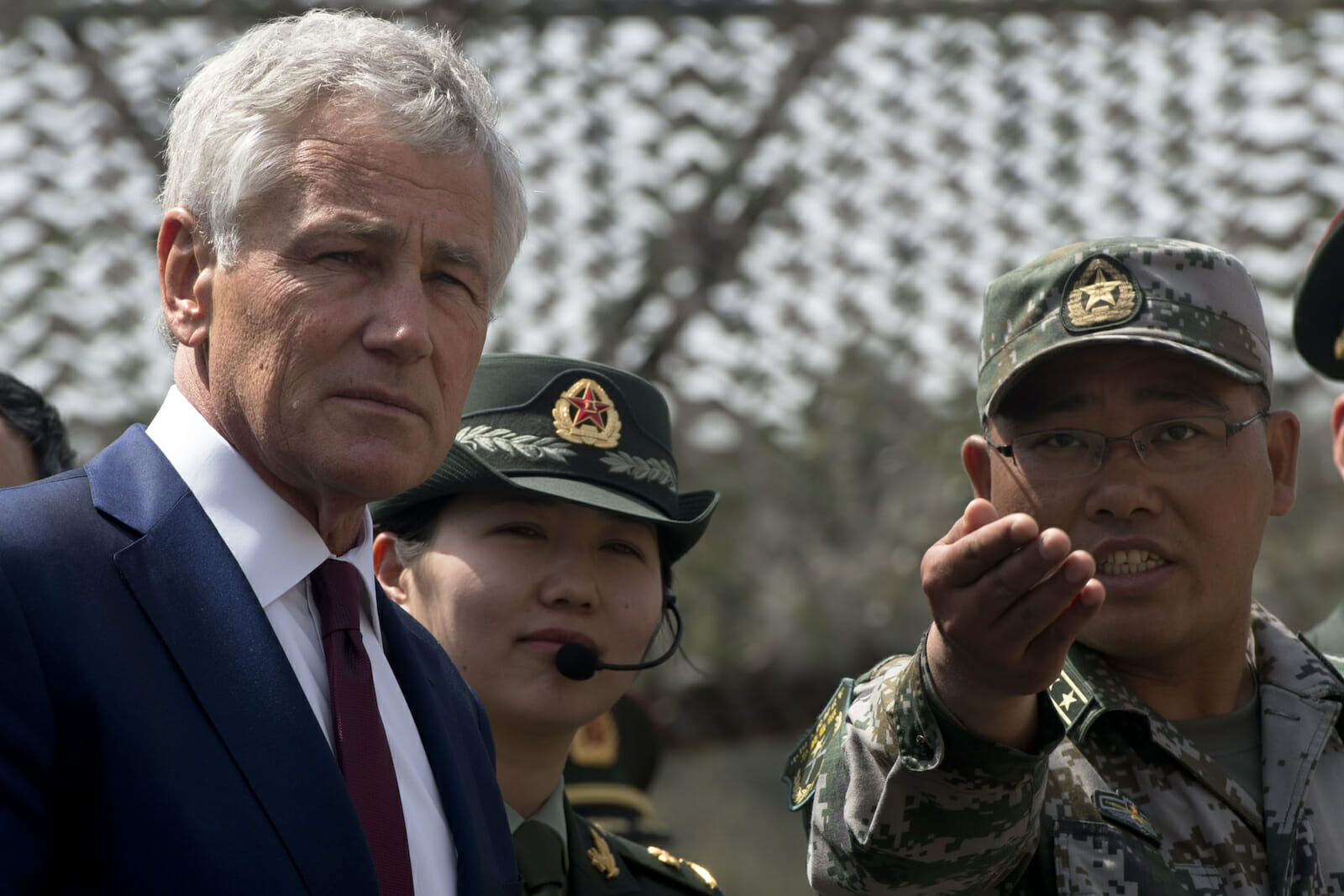
Gunboat Diplomacy in South China Sea Can Lead to a Red Line
The United States may be heading for another Red Line moment–this time with China. Defense Secretary Chuck Hagel making his fourth trip to the South China Sea region recently wanted to reassure Japan and other nations that the U.S. stands with them if China pursues stated territorial annexation. The “Sleeping Dragon” has arisen, hungry for the small mostly uninhabited islands in the East and the South China Sea claimed by Japan, Philippines, Brunei, Malaysia, Vietnam, and Taiwan. Mr. Hagel’s visit comes on the heels of Russia’s takeover of Crimea which had been part of Ukraine.
The fear is that China has been emboldened by Russia’s move, leading to similar action over the long-disputed islands. China claims its rights to the islands go back 2,000 years, which could possibly include the international waterways between them. Former Secretary of State Hillary Clinton previously noted that unimpeded navigation access was important to U.S. national interests. More than half of the world’s merchant goods flow through these waters.
Mr. Hagel announced that two additional guided missile destroyers would be sent, bringing the total to seven U.S. warships in the China Sea region.
The news gave Chinese officials the opportunity to showcase their newly refurbished Soviet aircraft carrier, the Liaoning, with its J-15 fighter jet strike group, signaling China’s growing global reach. China’s claim of territorial sovereignty over the islands was made very clear. Any provocation would require a response—crossing their Red Line. China has a growing global appetite, expanding its economic interests in every continent. Chinese warships could soon be cruising off the coasts of Africa, South America, and North America to protect their interests.
The immediate concern however to U.S. national security is North Korea, where the ruler Kim Jong-un has been building up a weapons arsenal that could include nuclear capability. Kim Jong-un believes the U.S. is plotting to depose him, which would be crossing his Red Line–requiring a military response. A stopover by Mr. Hagel would have been a good start for diplomatic dialogue, possibly averting a military confrontation. U.S. foreign policy is viewed in a number of countries as being inconsistent, except where economic interests are concerned. The U.S.-NATO incursion into Libya in 2011 appeared to be more about oil than building democratic institutions. Libya has the world’s fifth-largest reserves, with 85 percent going to European countries.
Back in history, Mohammad Mosaddegh was the first democratically elected Prime Minister of Iran in 1951. Two years later he was deposed in a coup d’état orchestrated by British and American intelligence agencies. Mosaddegh had nationalized the Anglo-Iranian Oil Company, a major source of oil for Europe. Today in Syria the U.S. wants to oust Bashar al-Assad, the country’s ruler, and seek democratic elections. In addition, a neighboring Arab country wants to run a natural gas line through Syria to reach Europe, but Assad stands in the way. After the Arab Spring uprisings in Egypt, the U.S. was concerned about access to the Suez Canal. So the U.S. mentored the Muslim Brotherhood on the election process, which brought to power Mohamed Morsi. One year later Morsi was deposed, almost destroying the country attempting to institute Sharia law.
The U.S. and the European Union want to stop Russia from further control over Ukraine. Sending NATO forces to Eastern Europe is seriously being considered. Such action needs to be carefully thought through, so a toe-to-toe standoff with Russian troops does not escalate into war, with Eastern European countries caught in the middle. The European Union needs to take the lead and find a diplomatic solution since it is in their backyard. Mr. Obama needs Mr. Putin’s cooperation in Syria to help destroy the chemical weapons cache, and in Iran to halt the nuclear weapons enrichment program. Together these leaders need to arrive at a diplomatic solution. We don’t want Mr. Putin to lose interest and draw a Red Line over the Ukraine issue.
U.S. focus has shifted away from Africa since the Arab Spring. However, the region still represents a concern to our national security interests. Today Osama bin Laden’s “jihad” against the U.S. remains in place. Islamists linked to al-Qaeda continue to undertake attacks daily, killing hundreds of innocent people in North Africa, the Sahel region and as far away as Iraq in the Middle East.
The U.S. Combined Joint Task Force-Horn of Africa (CJTF-HOA) was established in October 2002, based in Djibouti. Its mission included undertaking military training with East African military forces, and to protect our security interests in the region. In 2007 the U.S. Africa Command (AFRICOM) was formed to combine the three U.S. military commands that had oversight of the continent. With its headquarters in Germany, AFRICOM has only had a limited impact in Africa. Many of the terrorist attacks against the U.S. have emanated from the Horn of Africa and the Sahel region.
Hundreds of people die daily at the hands of al-Qaeda linked Islamists embedded across Africa. Refugee camps in Kenya, Uganda, Niger, Chad, Burkina Faso, and Mauritania are filled with millions of displaced Africans who have fled from Sudan, Somalia, Central African Republic, Democratic Republic of Congo, Nigeria, Niger, and Mali. Islamist extremists operating in the region are bent on creating Islamic states ruled under Sharia law.
This week more than seventy people were killed in Nigeria by an Islamist bomb attack in Abuja, Nigeria’s capital; more than 2,000 have died so far this year. In Tripoli, Libya’s capital the Jordanian ambassador was kidnapped, and Libya’s second prime minister in less than a month resigned under Islamist threats. In 2014 there have been numerous killings and other abductions, including a Libyan government leader, five Egyptian diplomats, and one Tunisian diplomat. In northern Mali Islamists in 2012 kidnapped seven Algerian diplomats of which one was killed, three released for ransom, and three are still being held.
A new “West African Spring” is brewing in Burkina Faso, where 10,000 impoverished demonstrators took to the streets in January 2014. They protested over poverty conditions and against President Blaise Compaore seeking re-election after twenty-eight years in power. There is great fear that the uprisings could spread to neighboring countries, allowing Islamists to gain control in any chaotic governing situation.
The U.S. should not be drawn into a confrontation with China over the island claims. Keeping the shipping lanes open is of mutual interest for access to the world markets. In the Middle East we need Mr. Putin’s help in resolving the crisis there. Diplomacy is “key” to averting a confrontation with either China or Russia. The U.S. needs to focus on the chemical weapons in Syria; the Iran and North Korea nuclear weapons programs. The U.S. needs to help train the African country military forces, where Islamists attacks run rampant. These issues affect our national security interests.
